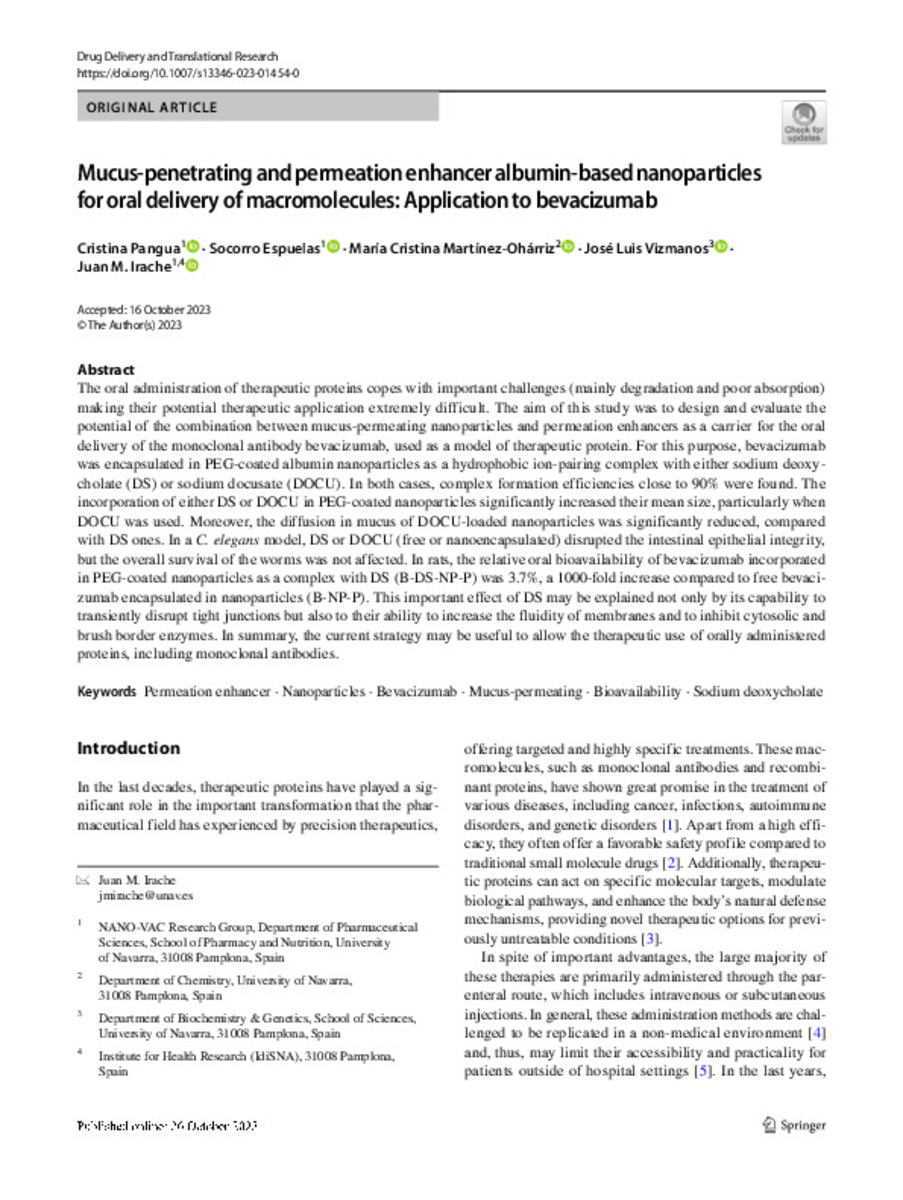Full metadata record
| DC Field | Value | Language |
|---|---|---|
| dc.creator | Pangua-Irigaray, C. (Cristina) | - |
| dc.creator | Espuelas, S. (Socorro) | - |
| dc.creator | Martinez-Oharriz, C. (Cristina) | - |
| dc.creator | Vizmanos-Pérez, J.L. (José Luis) | - |
| dc.creator | Irache, J.M. (Juan Manuel) | - |
| dc.date.accessioned | 2024-02-08T14:38:53Z | - |
| dc.date.available | 2024-02-08T14:38:53Z | - |
| dc.date.issued | 2023 | - |
| dc.identifier.citation | Pangua, C., Espuelas, S., Martínez-Ohárriz, M.C. et al. Mucus-penetrating and permeation enhancer albumin-based nanoparticles for oral delivery of macromolecules: Application to bevacizumab. Drug Deliv. and Transl. Res. (2023). https://doi.org/10.1007/s13346-023-01454-0 | es_ES |
| dc.identifier.issn | 2190-393X | - |
| dc.identifier.uri | https://hdl.handle.net/10171/68932 | - |
| dc.description.abstract | The oral administration of therapeutic proteins copes with important challenges (mainly degradation and poor absorption) making their potential therapeutic application extremely difficult. The aim of this study was to design and evaluate the potential of the combination between mucus-permeating nanoparticles and permeation enhancers as a carrier for the oral delivery of the monoclonal antibody bevacizumab, used as a model of therapeutic protein. For this purpose, bevacizumab was encapsulated in PEG-coated albumin nanoparticles as a hydrophobic ion-pairing complex with either sodium deoxycholate (DS) or sodium docusate (DOCU). In both cases, complex formation efficiencies close to 90% were found. The incorporation of either DS or DOCU in PEG-coated nanoparticles significantly increased their mean size, particularly when DOCU was used. Moreover, the diffusion in mucus of DOCU-loaded nanoparticles was significantly reduced, compared with DS ones. In a C. elegans model, DS or DOCU (free or nanoencapsulated) disrupted the intestinal epithelial integrity, but the overall survival of the worms was not affected. In rats, the relative oral bioavailability of bevacizumab incorporated in PEG-coated nanoparticles as a complex with DS (B-DS-NP-P) was 3.7%, a 1000-fold increase compared to free bevacizumab encapsulated in nanoparticles (B-NP-P). This important effect of DS may be explained not only by its capability to transiently disrupt tight junctions but also to their ability to increase the fluidity of membranes and to inhibit cytosolic and brush border enzymes. In summary, the current strategy may be useful to allow the therapeutic use of orally administered proteins, including monoclonal antibodies. | es_ES |
| dc.description.sponsorship | Cristina Pangua acknowledges the Spanish Association Against Cancer Scientific Foundation (AECC FC) for the predoctoral fellowship PRDNA21586PANG. C. elegans FT63 strain was provided by the CGC, which is funded by NIH Office of Research Infrastructure Programs (P40 OD010440). | es_ES |
| dc.language.iso | eng | es_ES |
| dc.publisher | Springer | es_ES |
| dc.rights | info:eu-repo/semantics/openAccess | es_ES |
| dc.subject | Permeation enhancer | es_ES |
| dc.subject | Nanoparticles | es_ES |
| dc.subject | Bevacizumab | es_ES |
| dc.subject | Mucus-permeating | es_ES |
| dc.subject | Bioavailability | es_ES |
| dc.subject | Sodium deoxycholate | es_ES |
| dc.title | Mucus‑penetrating and permeation enhancer albumin‑based nanoparticles for oral delivery of macromolecules: Application to bevacizumab | es_ES |
| dc.type | info:eu-repo/semantics/article | es_ES |
| dc.description.note | Creative Commons Attribution 4.0 International License | es_ES |
| dc.editorial.note | The online version contains supplementary material available at https://doi.org/10.1007/s13346-023-01454-0 | es_ES |
| dc.identifier.doi | 10.1007/s13346-023-01454-0 | - |
Files in This Item:
Statistics and impact
Items in Dadun are protected by copyright, with all rights reserved, unless otherwise indicated.






